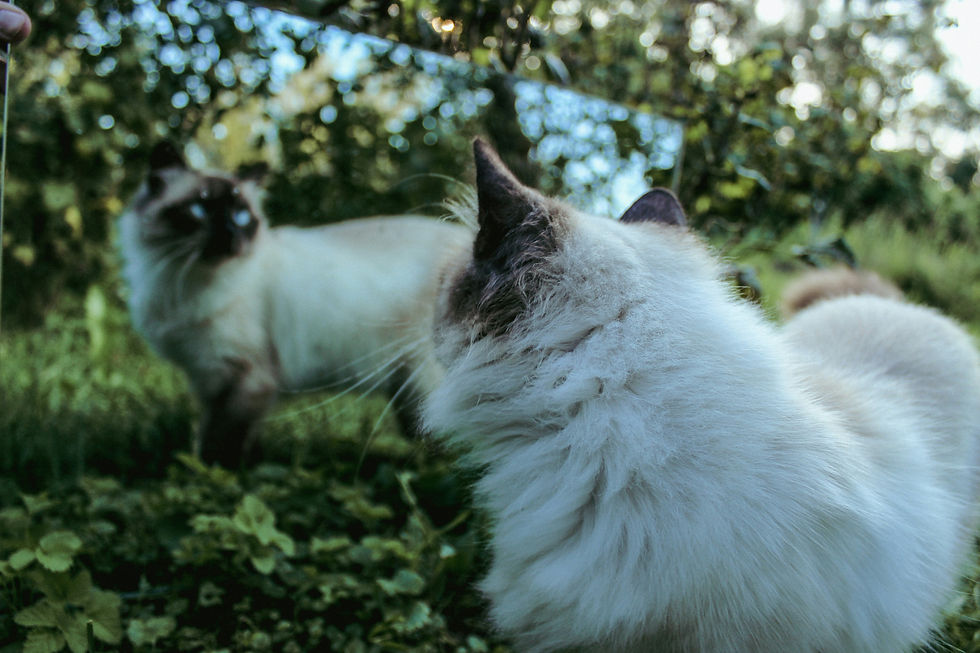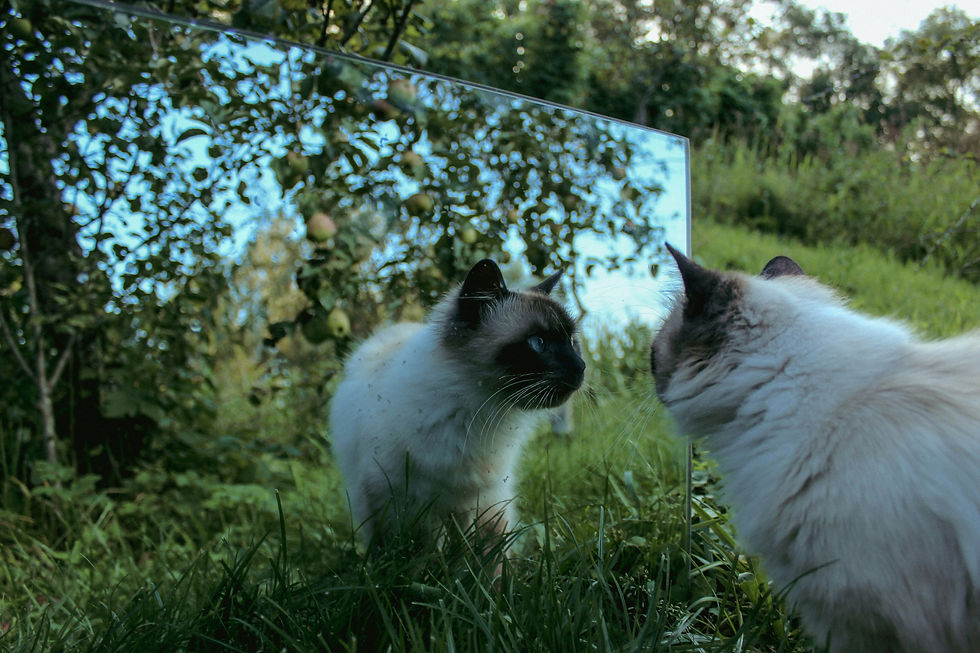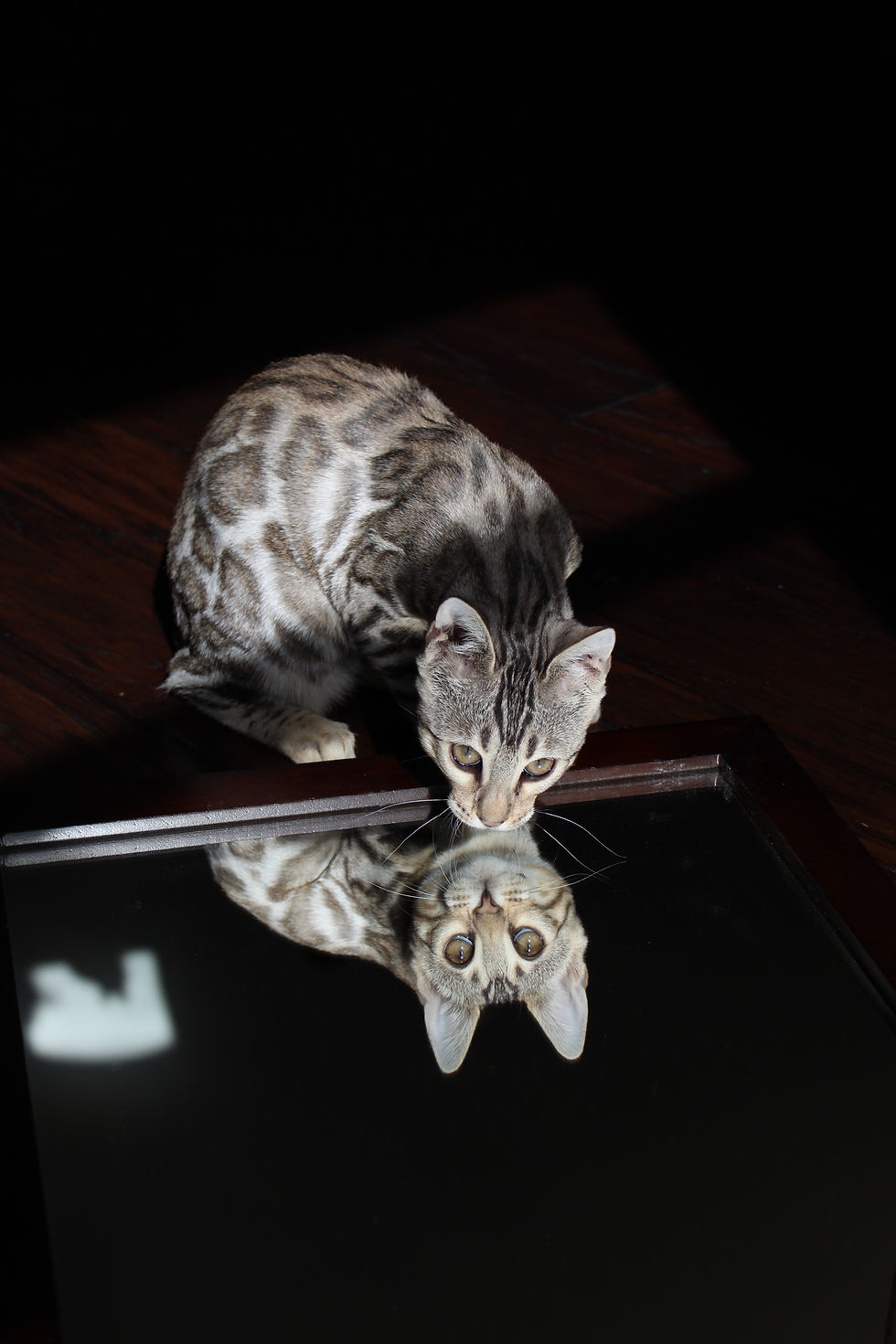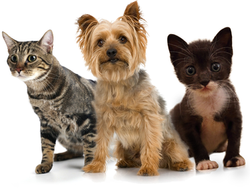Why Does My Cat Stare at Herself in the Mirror? Understanding the Mysterious Mirror Behavior of Our Feline Friends
- ER Kent

- Jul 24, 2025
- 5 min read
Cats are endlessly fascinating creatures, full of quirks that both entertain and puzzle their human companions

One particularly mystifying behavior many cat owners observe is the prolonged mirror stare—your cat quietly sitting or standing before a mirror, gazing at her reflection as if deep in thought. Is she admiring herself? Preparing to pounce? Trying to communicate? While it may look like your feline is lost in vanity or self-reflection, the truth behind this behavior is far more nuanced—and rooted in feline psychology and sensory biology.
So what is going through your cat’s mind when she stares at herself in the mirror? Let’s take a closer look at the science, behavior, and theories behind this curious pastime.

The Mirror Test: Do Cats Recognize Themselves?
The question of whether animals recognize themselves in mirrors has fascinated scientists for decades. The “mirror self-recognition test” (MSR), first developed by psychologist Gordon Gallup Jr. in 1970, is one way researchers try to determine whether an animal possesses self-awareness. In this test, a colored, odorless mark is placed on an animal’s body in a spot they can only see with the aid of a mirror. If the animal uses the mirror to investigate or touch the mark on its own body, it’s taken as evidence of self-recognition.
So far, only a few species have passed the MSR test, including great apes, dolphins, elephants, magpies, and a small number of ants. Cats, however, do not pass the test. When presented with a mirror, most cats do not show any sign that they understand the reflection is themselves. This doesn’t mean cats are unintelligent—rather, it suggests they don’t use mirrors in the way humans or some other animals do.
Instead, most feline responses to mirrors fall into a few distinct categories.

Common Cat Responses to Mirrors
When your cat stares into a mirror, her behavior can vary depending on her personality, experience, and current mood. Here are a few common mirror responses observed in domestic cats:
1. Curiosity and Investigation
Many cats initially treat their reflection as if it’s another animal. They may sniff around the mirror, paw at it, or try to peer behind it. This is a natural response to seeing what appears to be another cat without any accompanying scent or sound. For a scent-driven creature, this discrepancy is puzzling.
2. Indifference
Once a cat realizes the reflection doesn’t interact or pose a threat, she often loses interest. Some cats will walk away and never seem to acknowledge the mirror again. Others, however, may return periodically out of habit or momentary intrigue.
3. Aggression or Defensive Behavior
Some cats react to the “other cat” in the mirror with signs of territorial aggression—hissing, puffing up, growling, or even swatting. These behaviors are especially common in intact males or in cats not socialized with others. This reaction typically fades over time as the cat habituates to the reflection.
4. Still Staring
Perhaps the most perplexing behavior of all is when a cat simply sits and gazes quietly at her reflection for long stretches of time. To us, it can look like introspection or even existential pondering—but is that really what’s happening?

Why Does She Keep Staring? Possible Explanations
If your cat returns to the mirror again and again just to sit and stare, several possible explanations could be at play:
Movement Fascination
Cats are highly sensitive to motion, including subtle changes in light and shadow. A cat may find her own reflected movements captivating—especially the flick of her tail or the slight twitch of an ear. Mirrors can also reflect other motion in the room, like ceiling fans or window curtains, giving the cat something interesting to track.
Visual Novelty
Unlike humans, cats do not rely heavily on vision for identity or communication. However, they do notice changes in their environment. A mirror image may simply provide a visually stimulating, shifting pattern that’s different from the usual view.
Comfort and Calm
Some cats may simply enjoy the mirror space for reasons unrelated to the reflection—perhaps it's near a sunny window, or it reflects a part of the room they like. The staring may be incidental to being in a comfortable, familiar spot.
Predatory or Territorial Instincts
In multi-cat households, a cat might use the mirror to monitor another feline's movement indirectly. Alternatively, if your cat is particularly territorial, she may keep an eye on the reflection just in case it does something unexpected.
Lack of Scent Clues
Cats are strongly guided by scent, and when they see a “cat” in the mirror with no corresponding odor, it may keep them intrigued or confused. Their brains might not fully “dismiss” the presence of the image, even if it's not threatening.
Neurological or Cognitive Factors
In rare cases, excessive mirror-staring could be a sign of cognitive decline in older cats or an obsessive-compulsive behavior. However, this is unusual and usually accompanied by other behavioral changes.

What Is She Thinking?
It’s tempting to imagine that your cat is having deep, self-reflective thoughts while gazing into the mirror—perhaps contemplating her existence or admiring her whiskers. While we can’t definitively say what she’s thinking, we do know that cats do not possess the kind of self-awareness that humans do.
Instead, it’s likely that your cat is:
Processing an ambiguous visual cue
Reacting to perceived movement
Entertaining herself with a non-threatening “presence”
Simply sitting in a comfortable spot and zoning out
In essence, her mirror-gazing is probably not about herself at all, but rather about the image as an object of interest in her environment.

Should You Be Concerned?
In most cases, there is no need to worry about your cat’s mirror fascination. If the behavior is calm, non-aggressive, and not obsessive to the point of ignoring food, play, or human interaction, it’s likely just one of her many quirky habits. However, if your cat becomes visibly stressed around mirrors—hissing, hiding, or acting fearful—you may want to cover or move the mirror to reduce anxiety.
In elderly cats, obsessive staring (with or without a mirror) can occasionally be a sign of feline cognitive dysfunction syndrome (feline dementia). If your senior cat suddenly begins spending excessive time in front of mirrors or staring into space, consult a veterinarian for a check-up.

Living Peacefully with a Mirror-Loving Cat
If your feline enjoys her reflection, you can leave the mirror accessible as long as it doesn’t cause distress. Some cat owners even place small, unbreakable mirrors at cat height in their homes to provide a bit of extra enrichment. Just make sure the mirror is securely fastened, especially if your cat is the kind to bat at it or jump toward the image.
Cats live in a richly sensory world far different from our own, and their unique interpretations of everyday objects—including mirrors—are part of what makes sharing our homes with them such a delight. Whether your cat is contemplating her place in the universe or simply entertained by the twitch of her own tail, there’s beauty in her mystery.
So next time your cat pauses to stare into the mirror, take a moment to appreciate the quiet complexity of her mind—and let her have that moment of reflection, whatever it may mean to her.








Comments